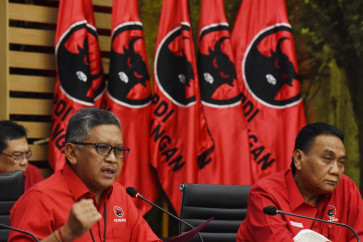'Pee-power' launched to light camps in disaster zones
Pee power: The pee-power technology, developed in a partnership between researchers at UWE Bristol and Oxfam, will light rooms in refugee camps, which are often dark and dangerous places particularly for women
Change Size
 Pee power: The pee-power technology, developed in a partnership between researchers at UWE Bristol and Oxfam, will light rooms in refugee camps, which are often dark and dangerous places particularly for women. (Courtesy of Oxfam) (Courtesy of Oxfam)
Pee power: The pee-power technology, developed in a partnership between researchers at UWE Bristol and Oxfam, will light rooms in refugee camps, which are often dark and dangerous places particularly for women. (Courtesy of Oxfam) (Courtesy of Oxfam)
P
span class="inline inline-center">Pee power: The pee-power technology, developed in a partnership between researchers at UWE Bristol and Oxfam, will light rooms in refugee camps, which are often dark and dangerous places particularly for women. (Courtesy of Oxfam)
A joint project between the University of the West of England (UWE) Bristol and international humanitarian agency Oxfam has resulted in a prototype urinal that proves that pee can generate electricity.
Bristol BioEnergy Centre director Ioannis Ieropoulos said the research team had already proven that this way of generating electricity worked.
'This exciting project with Oxfam could have a huge impact in refugee camps,' said Ieropoulos, who also led the research team leader.
The Bristol BioEnergy Centre's work hit the headlines in 2013 when the team demonstrated that electricity generated by microbial fuel cell (MFC) stacks could power a mobile phone.
The pee-power technology can hopefully light rooms in refugee camps that are often dark and dangerous places particularly for women.
Students and staff are being asked to use the urinal, conveniently situated near the Student Union Bar at the university, to donate pee to fuel MFC stacks that generate electricity to power indoor lighting.
"The microbial fuel cells work by employing live microbes that feed on urine (fuel) for their own growth and maintenance. The MFC is, in effect, a system which taps a portion of that biochemical energy used for microbial growth, and converts that directly into electricity - what we are calling urine-tricity or pee power,' said Ieropoulos.
'This technology is about as green as it gets, as we do not need to utilize fossil fuels and we are effectively using a waste product that will be in plentiful supply.'
The urinal on the university campus resembles toilets used in refugee camps by Oxfam to make the trial as realistic as possible.
'[...] it is always a challenge to light inaccessible areas far from a power supply. This technology is a huge step forward,' Oxfam's head of water and sanitation Andy Bastable said.
'Living in a refugee camp is hard enough without the added threat of being assaulted in dark places at night. The potential of this invention is huge.'
One microbial fuel cell costs about £1 to make.
'We think that a small unit like the demo we have mocked up for this experiment could cost as little as £600 to set up, which is a significant bonus as this technology is, in theory, everlasting,' Ieropoulos said. (ebf)(+++)









